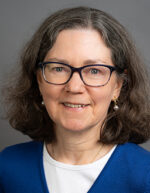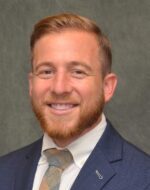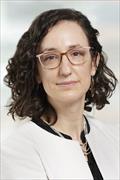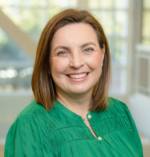Third Annual Alan and Sybil Edelstein Professionalism & Ethics in Medicine Lecture Tackles Genetic Testing
Panelists at the Third Annual Alan and Sybil Edelstein Professionalism & Ethics in Medicine Lecture described the ethical maze of laws, professional and personal responsibility and societal values swirling around the rapidly evolving field of genetic testing. Speaking to more than 100 viewers attending the online March 25 lecture, David Edelstein, MD’80, co-hosting with his sister Marcia Edelstein Herrmann, MD’78, said the event named for their parents laid out the difficulties and ethical issues of these emerging technologies.
“Who owns the data? How do you explain it? Who in the family should know about results? And (what)…is the responsibility of the physicians to let the patients know of changes that could occur…years later,” said Edelstein, chief of otolaryngology at Manhattan Eye, Ear, & Throat Hospital.
 Jodi Hoffman
Jodi Hoffman
Panelist Jodi Hoffman, MD, associate professor of pediatrics and Boston Medical Center’s chief of medical genetics in pediatrics, noted the principles of ethics that apply to all branches of medicine: beneficence, non-maleficence, autonomy and justice.
“But when we practice genetics, there are some additional principles that we have to keep in mind: informed consent, confidentiality, the duty to warn or inform, as well as fidelity or veracity,” she said. “We want to make sure that when people have genetic testing, they have the full capacity to understand what they are being offered, exactly what sort of testing we will be doing and that they are able to choose to do this testing or not to do this testing.”
Genetics has evolved from single-gene testing to exome and genome sequencing, which looks at all the DNA of our genetic code, said Hoffman. That can lead to unexpected findings, like the discovery of a debilitating or fatal condition, or other information unrelated to the original reason for the testing, resulting in ethical dilemmas for patients and physicians.
“If we find out that a child is not related to the man who thinks he is the father, do we let them know, if that was not the question being asked?” said Hoffman. She said research has shown that most patients want to know all that is discovered by their genetic test.
 Margaret Kenna
Margaret Kenna
Childhood hearing loss has a strong genetic component, said panelist Margaret Kenna, MD’79, MPH, director of clinical research in otolaryngology and communication enhancement at Boston Children’s Hospital, and professor of otolaryngology-head and neck surgery at Harvard Medical School.
“We test for 150 or so hearing loss genes,” she said. But that testing can have other implications in addition to a diagnosis. Kenna described cases where genetic testing raised ethical questions for providers, including in vitro clients selecting for sex in embryos even when it entailed an inherited gene that likely would result in a child with significant hearing loss; the possibility that a deaf couple would use genetic testing to select for a deaf child; a genetic test to determine whether a prospective bride carries an inherited hearing loss gene.
“What is the duty of the physician? Is the mother the patient, or the baby?…What is the outcome of genetic testing on the marriage of this woman?” Kenna asked. “These are very big and new challenges for us.”
 Daniel Faden
Daniel Faden
Panelist Daniel Faden, MD’11, FACS, a head and neck surgical oncologist and scientist who practices at BMC and Mass Eye and Ear, and an assistant professor of otolaryngology-head and neck surgery at Harvard Medical School, urged caution about genetic testing marketed to the public as screenings for cancers, known as Multi Cancer Early Detection (MCED) tests. He worried about the balance between causing patient anxiety and the benefits of catching a cancer early and treating it.
“I’m a big believer in the potential for MCEDs to revolutionize cancer screening but I think we’ve gotten a little ahead of ourselves,” he said.
In the U.S. in the age group targeted for this testing even a 1% inaccuracy rate yields nearly a million false positives, said Faden. “That’s almost a million people you’d be telling had a cancer who actually don’t have one.”
 Erica Holland
Erica Holland
Panelist Erica Holland, MD, assistant professor of obstetrics & gynecology and BMC director of maternal and fetal medicine, talked about the perils of patients putting too much faith in genetic testing. Holland described the case of a 30-year-old patient whose provider suggested a prenatal cell-free DNA test. This is a blood test that check’s the fetus DNA, circulating in the mother’s blood, for conditions, like Down syndrome.
When DNA test results revealed minimal risk, the patient decided to skip her first trimester ultrasound. But, at her 20-week anatomical exam, physicians found that her baby had a congenital diaphragmatic hernia, in which the abdominal contents protrude into the chest cavity, a potentially fatal condition.
“As exciting as cell-free DNA is, as an opportunity to learn information about a pregnancy without invasive testing like amniocentesis that uses a needle to withdraw a sample of amniotic fluid…there are many challenges to this technology,” said Holland, including the possibility that the placental DNA does not match the DNA of the fetus.
These genetic tests also can reveal other conditions and raise ethical issues for the provider on what they should share with the patient, although Holland pointed out that a survey of patients whose cell-free DNA tests uncovered maternal cancer still viewed the test’s ability to detect it as a benefit and wanted those results communicated to them.
Holland said her team at BMC is working to reduce societal and educational barriers in communicating the risks and rewards of genetic testing. Holland said the prenatal genetic counseling team at BMC, led by Philip Connors MS’14, MPH, CGC, an assistant professor of obstetrics & gynecology, is working to reduce societal and educational barriers in communicating the risks and rewards of genetic testing. Patients awaiting their first trimester ultrasounds are shown videos, created by Connors, explaining the test. High-risk patients speak directly with a genetics counselor.
 Wendy Kuohung
Wendy Kuohung
Panelist Wendy Kuohung, MD, an associate professor of obstetrics & gynecology and director of reproductive endocrinology and infertility at BMC, addressed another frontier of medical ethics and professionalism, the use of preimplantation genetic testing, or PGT, in selecting embryos for transfer in the in vitro fertilization process.
“There are cases where the provider may find the patient desire to use PGT ethically problematic,” she said, noting Kenna’s case of a couple wanting to select a female embryo despite PGT revealing a gene for deafness.
PGT for aneuploidy, or PGT-A, is used in 40% of all in vitro fertilization cycles in the U.S., most frequently to select embryos with the normal number of chromosomes as opposed to those with missing or extra chromosomes that are more likely to result in miscarriage, cycle failure, or birth of a baby with birth defects. Other PGT tests include ones looking for genetic signatures of various inherited conditions or diseases (PGT-M for monogenic disorders), for changes in chromosome structure (PGT-SR for structural rearrangements), and for complex diseases presenting later in life (PGT-P for polygenic risk) such as diabetes, cancer syndromes, and cardiovascular disease. Of PGT-P, Kuohung stated “It’s like the new kid on the block and isn’t quite as widely employed and is not as widely accepted,” and brought up the question of whether it was ethical to choose embryos based on their genetic predisposition to a disorder that does not appear until adulthood.
Kuohung described a controversial use of human leukocyte antigen (HLA) testing (that looks for a complex of genes critical in the regulation of the immune system) in selecting for “savior siblings,” embryos that will result in children who can serve as a bone marrow donor for a sibling with a severe blood disorder such as Fanconi anemia best treated by bone marrow transplant.
But it’s not always as straightforward as adhering to your ethical barometer. The American Society for Reproductive Medicine issued guidelines in 2001 on embryonic sex selection to allow for family balancing, choosing an embryo of a sex different from their current child. Other thorny considerations include the transferring of embryos that PGT testing has shown to have an abnormal genetic makeup. Kuohung proposed a case of an older infertile patient with diminished ovarian reserve whose only available embryo tested positive for genes that might lead to Down syndrome and who requested transfer of the embryo.
“Most fertility doctors will refuse to transfer the Down syndrome embryo due to the ethical mandate to do no harm, but they may be depriving that patient of ever having a pregnancy if that embryo is the only one the patient has,” said Kuohung.
“In addressing these questions, there is no right answer that applies to every patient,” she said.
Kuohung said there are guiding principles to help both providers and patients in their decisions.
“We have to acknowledge that the patient has autonomy, the right to make decisions regarding one’s own health care…All persons have the right to reproduce and make treatment decisions,” she said.
But in addition to their duty to do no harm and to the welfare of the future child and society, providers may exercise the freedom to grant or deny their services based on their own ethical principles, she said.
 Kathleen Swenson
Kathleen Swenson
“Genetic counselors support patients, knowing they are resilient, that their emotions matter,” said panelist Kathleen Swenson, MS, MPH, CGC, a clinical associate professor of medical sciences & education and director of the master’s program in genetic counseling.
Swenson pointed out that many of these issues preexisted new genetic technologies like prenatal cell-free DNA and involved a similar decision process. She described the case of a 32-year-old woman whose maternal serum screen, used to detect a protein tied to open neural tube defects, led to a diagnosis of her advanced colon cancer.
After consulting with her oncologist, the woman proceeded with her pregnancy and gave birth, said Swenson, who supported her during her follow up visits to the hospital for ultrasounds and prenatal care and remained in close contact with her family throughout the delivery and her death shortly after.
“(We) help our patients understand and apply information to make decisions, manage the conditions, adapt to the situation,” said Swenson.
View all posts